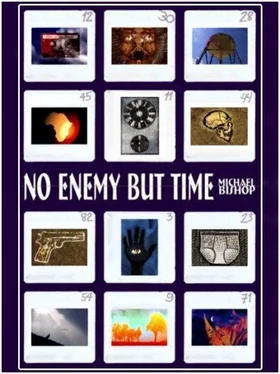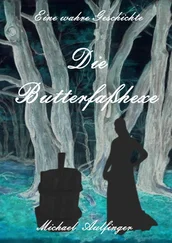Wiping his brow with a handkerchief and humorously pursing his lips, the Great Man returned to Joshua.
“They’re a decent enough crew, I think. Ignorant about human prehistory, of course. We’d probably do well to indulge them in a couple of their whims.”
“What were they saying about me?”
“Why, nothing. Nothing more than what they were saying about the lot of us, that is.”
“And what was that?”
“Referred to us, jocularly, as iloridaa enjekat , I’m afraid. Sounds lovely if you don’t know what it means.”
“ Iloridaa what?”
“ Enjekat , Joshua. Means ‘those who confine their farts.’ Has to do with the kinds of breeches we wear.”
“Jocularly?”
“Well, I would say so. On the whole, they were quite pleasant.”
“What do they want? Did you tell them to move?”
“I asked them to move, Joshua. However, they’re not going to pack off without a concession or two from the man who had this traditional grazing area proclaimed a state protectorate.”
“They’ve got your number, then.”
“Well, they know who I am, of course. Figured that out readily enough. It tickles them to have run up against the High Mucky-Muck of the interior ministry, so to speak. I’m the chap who displaces living people to dig up the bones of dead ones.”
“They look tickled.”
Kaprow stepped down from The Machine. He stood with one hand on the door, waiting for Blair and Joshua to come abreast. “What’s the matter?” he asked. “If Joshua’s going to get off by tomorrow morning, we need to get set up.”
Blair said, “Dr. Kaprow, a great many things in Africa are on permanent hold. I’m afraid you’re going to have to—”
“We have a schedule. If we don’t—”
“We will, Dr. Kaprow, we will. I should have had a police unit from one of the frontier outposts sweep the area. Unfortunately, the protectorate’s a little too big to fence.”
“Unfortunately,” Joshua echoed the Great Man. He pulled the moist material of his shirt away from his rib cage and wiped his forehead with his wrist. Out here, stickiness was a chronic affliction.
“What do they want?”
“They each want an item in trade, Dr. Kaprow. In addition, two of them would like a special favor.”
“Trade? What do we get?”
“Their cattle out of the road, I would imagine.”
“And the special favor?”
“Let’s meet their specific demands first, shall we? The special favor is going to require a little of our time.”
“That’s exactly what I had hoped to save, sir.”
“Nevertheless,” said Alistair Patrick Blair.
The warriors’ specific requests were simple, either poignant or grasping depending on your relationship to the item forfeited. Joshua yielded a leather belt with a brass buckle on which the jaunty figure of Mickey Mouse had been embossed. Kaprow, bewildered, forked over several American coins, while Blair made a lavishly eloquent presentation of his meerschaum pipe. The air policeman in the Land Rover, despite protesting that its sacrifice would put him in violation of the Air Force dress code, gave up his silver helmet, along with its camouflage net.
Finding that the helmet fit perfectly, the Sambusai warrior who had acquired it began chanting softly and doing gentle leaps, a Mona Lisa beatitude veiling his features. His tribesmen staggered about laughing, unable to puncture his composure with their jibes and catcalls. Then, controlling their mirth, they approached Blair with another request.
“What now?” Kaprow asked warily.
“They’re envious of the helmet, but don’t see any others to choose from. They’ll settle for cardboard sun visors.”
“Oh, good.”
Joshua saw that a group of technicians (Americans) and field workers (Zarakalis) had climbed out of the covered flatbed of the truck behind them. Several were wearing sun visors, which they readily doffed and handed over to Blair to give to the importunate herders. As soon as the Sambusai had put these on, they began leaping with their helmeted comrade. The support personnel from the truck came forward to watch. One or two of them joined the dance, pogo-sticking with good-natured incompetence. The activity reminded Joshua of fuzzy kinescopes of American Bandstand segments on which Philadelphia teenagers had surrendered to a form of rhythmic seizure called the Watusi. It had not looked exactly like this, but then the Sambusai were not the Watusi.
Kaprow said, “All we need now is a punch bowl and some helium balloons.”
The sun visors, Joshua noted, were red and white. They were emblazoned with the trademark of an American soft drink.
“My goodness, Dr. Kaprow,” said Blair. “You’re awfully young for a curmudgeon.”
“What’s the special favor they want? We need to grant it, if possible, and get on into camp.”
“They want to look inside The Machine.”
“ Look inside The Machine!”
“They’ve never seen so fat a motorcar before, and it arouses their curiosity.”
Kaprow turned the angry russet of a baked apple. “They can’t. It’s impossible. You know it’s impossible.”
“How badly do you want their cattle out of the road?” Blair put his hand on the physicist’s shoulder.
“You don’t think they’re going to steal your Nobel Prize poking around in there, do you? I’ve never been able to make brain or bunion of the whole untidy scramble.”
“It’s not your specialty, Dr. Blair.”
“Oh, I see. You believe these Sambusai herders are secret graduates of MIT, magna cum laude?”
“No, of course I don’t. It’s just that White Sphinx—”
“I’ll show them around inside,” Joshua interrupted. “A tour guide who doesn’t speak their lingo isn’t going to spill much, is he?”
Because he had to, Kaprow acquiesced. Blair politely intervened in the Sambusai’s dancing, and a moment later Joshua was leading two of the warriors to The Machine, where he pulled himself into a control space behind the cab. In this cramped chamber the Sambusai towered over him like professional basketball players. Their bodies gave off a unique commingling of scents: dung and cowhide, ocher and tallow, dust and sweat. To Joshua’s surprise they seemed even more nervous than he.
“This way, gentlemen.”
Joshua turned a key and a door panel slid back into the insulated six inches of interior bulkhead. The Sambusai were delighted. They grinned, exchanged unintelligible commentary, and sauntered into the bizarre cargo section of The Machine. A metal rail outlined a rectangular catwalk around the inside of the vehicle. Opposite the three men was a small bell-shaped booth of smoky glass, and beside the booth stood an air policeman with a submachine gun.
“It’s all right, Rick. We’ve got Dr. Kaprow’s permission.”
“They don’t plan to use those spears, do they?”
“Not that I know of. We’ll take a quick look around and get out of your hair.”
“What’s going on?”
“Intercultural collision. Fill you in later.”
The air policeman—Rick, a blond Iowa farm kid—lowered his weapon but maintained the alert feet-apart posture of a sentinel. He had, Joshua knew, only a distorted inkling of the purpose of the arcane machinery inside Dr. Kaprow’s vehicle, believing it a variety of mobile intelligence-gathering equipment meant to bolster Zarakal’s military position in the Horn. Why Dr. Kaprow had driven The Machine inland to Lake Kiboko he had no clear idea, however. He was a GI who kept his nose clean by obeying orders.
Sometimes, though, he wondered. Several months back, in the barracks at Russell-Tharaka, Rick had told Joshua that he could not imagine why anyone would go to war over such godforsaken territory. Step outside Marakoi and the ritzier sections of Bravanumbi (Rick had found two ritzy sections there), and Zarakal was your typical desert hell hole. Its world-famous big-game animals were being hunted to extinction or dying off naturally, and in another hundred years the Sahara would have crept so far south that half of Africa would consist of nothing but sand dunes. By then, according to Rick, Zarakal would be a sort of subsilicate Atlantis, submerged if not forgotten, and Uncle Sam’s initial investment would be utterly lost.
Читать дальше



![Ally Carter - [Gallagher Girls 01] I'd Tell You I Love You But Then I'd Have to Kill You](/books/262179/ally-carter-gallagher-girls-01-i-d-tell-you-i-lo-thumb.webp)








